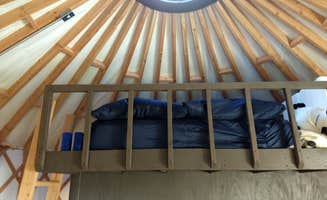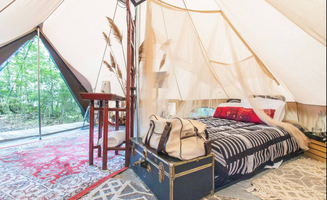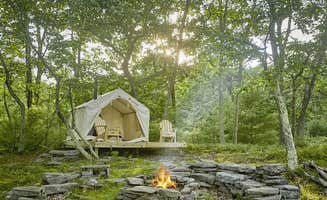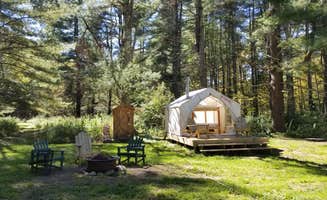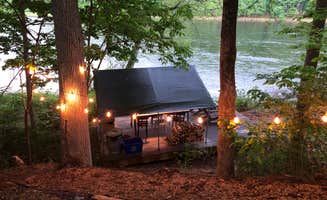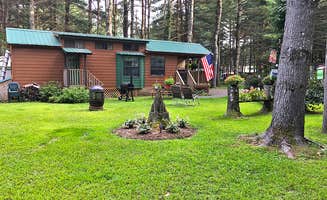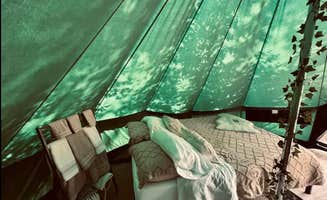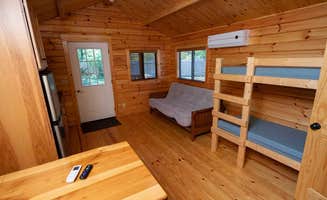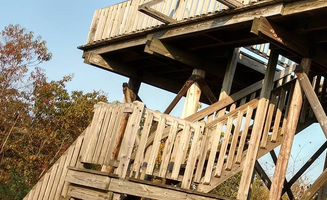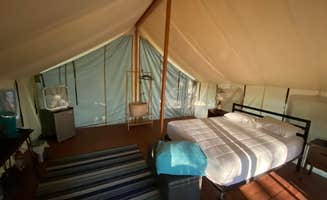The Catskills region around Liberty, New York features diverse terrain with elevations ranging from 1,500 to 4,000 feet, creating distinct microclimates that affect camping conditions throughout the year. Temperatures can drop significantly at night even in summer months, with typical summer highs in the 70s and lows in the 50s. Most glamping options in Liberty, New York are concentrated along waterways, providing easy access to fishing and water recreation.
What to do
Fishing excursions: Roscoe Campsites provides direct access to the Beaverkill River, known for excellent trout fishing. "Right on the Beaverkill River, it's quiet, clean, gorgeous, brand new cabins and concrete pads. Fisherman's heaven," notes Richard V. The area is nicknamed "Trout Town USA" and fishing licenses can be purchased in downtown Roscoe, just 3 minutes from the campground.
Water activities: Tube rentals are available near many campgrounds, though some campers recommend bringing your own equipment. At Kittatinny Campground, you can purchase activity packages that include river tubing. "Don't cheap out. Get the tubing package as well," advises Kendra P. The Delaware River offers calmer waters suitable for beginners and children, with tube rentals typically costing $20-40 depending on duration.
Hiking trails: Forest exploration opportunities abound with trails for all skill levels. At Alder Lake, campers can access multiple trails directly from camp. "The hike around the lake is a lovely, easy walk. The hike trail that connects to the far end of the lake is 6+ miles and while there were no real views, it was lovely. We also hiked the balsam lake fire tower which had nice views of the area," shares Erik C.
What campers like
Waterfront sites: Many campers specifically seek riverside and lakefront camping spots. At Russell Brook Campsites, water access is a major draw. "Our site was massive (39) and had direct access to Russell Brook. Couldn't keep my son out of the water. Very peaceful," one camper shared. The sound of flowing water enhances the sleeping experience: "The best part is the waterfront sites. We were right next to a small brook, and falling asleep to the sound of the water behind our tent was amazing."
Family amenities: Campgrounds with dedicated children's activities get high marks from family campers. "This campground is great for kids. It has events just about every weekend with kid activities," notes Jennifer I. about Jellystone Park Gardiner. The water features are particularly popular: "Nice pool that is shallow so you can relax and let the little ones go in the water park section alone or they have a 3 ft pool also."
Quiet weekday escapes: Midweek stays offer a more serene experience at most campgrounds. "Only ever been during mid week and the place is empty which is nice," reports Mike C. about Roscoe Campsites. For those seeking maximum seclusion, Alder Lake provides more isolated options: "The campsites are very spacious with lots of room between you and other campers, and have a fire pit and some have picnic tables."
What you should know
Seasonal considerations: Most campgrounds operate from May through October, with limited winter options. Oakland Valley Campground organizes its sites by level: "Top level has a pool, showers and bathrooms with laundry area and game room. Middle level has open field with bathrooms with sinks and running water. River level has more primitive bathrooms." River levels can affect activities – during dry periods, streams may be too shallow for proper kayaking.
Site selection matters: Campsites vary widely in privacy, terrain, and amenities even within the same campground. At Roscoe Campsites, "The 'tent sites' are VERY close together, and there is nothing separating them. If you're looking for quiet seclusion, don't even remotely consider this spot as an option." For tents specifically, ground conditions can be problematic: "The ground is worn over and very rocky. If you visit, bring incredibly thick sleeping pads or air mattresses if you want to sleep semi-comfortably."
Noise levels: Weekends bring larger crowds and higher noise levels at most campgrounds. One camper at Kittatinny noted: "A great place if you're a college kid looking to blast music and party into the late hours. Loud music blasting until 1-2am and it picks back up by 9-10am." For quieter stays, choose more secluded campgrounds or midweek visits when "the place is empty which is nice."
Tips for camping with families
Farm activities: Some campgrounds include farm experiences that engage children. At Roscoe Campsites, "The farm, playground, beach, and shallow river make it a great, easy entry point for new and younger campers." These activities provide structured entertainment without additional cost.
Water safety considerations: Rivers in the region vary in depth and current strength throughout the season. A camper at Roscoe noted concerns with rental activities: "With how shallow the river was, I would have been pretty nervous to take a tumble out of a kayak or paddle board. Maybe the river is higher at different times of the year and these activities are less dangerous?"
Playground proximity: Site location relative to playgrounds affects noise levels. At Jellystone Park Gardiner, some campers report: "Kids were at the playground 8 am or before and the noise woke us up. The kids were around until about 10:30 or so each night." Consider whether you prefer convenience or quiet when selecting your site.
Tips from RVers
Site leveling challenges: Many RV sites in the region require significant leveling. At Oakland Valley Campground, RVers note "the sites were a bit difficult to back into and unlevel. Otherwise a very nice place to relax."
Full hookup availability: Thousand Trails Rondout Valley provides comprehensive RV services with recent upgrades. "Many upgrades have been made over the past year which include all new SWE (full hookups) street lighting, and campground markings/numbering," notes a regular visitor. The campground offers a service to collect waste from your RV if you don't want to move to the dump station.
Firewood quality issues: Several campgrounds sell firewood of varying quality. At Roscoe Campsites, one camper advised: "Don't buy their wood - it didn't burn and was a waste of $ and time." Bringing your own seasoned firewood from within 50 miles is permitted at most sites, helping avoid frustration with damp or green wood.


